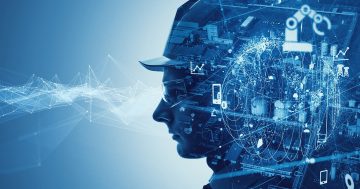
Machine learning has had a profound impact on various industries and businesses due to its ability to enhance predictive decision-making processes significantly. Image: File.
James Mason demonstrates how the data we are feeding into computers is changing our lives both at work and in the home, offering incredible possibilities – and significant challenges.
You’ve probably heard the term ‘’machine learning’’ at some point, but what exactly is it?
Let’s break it down in a way that’s easy to understand.
Machine learning is a subset of artificial intelligence (AI). Its focus is teaching computers to diagnose and learn from data and improve over time without the intervention of a controlled program application.
Machine learning involves providing lots of data into algorithms – finite sequences of well-defined instructions or steps designed to perform a calculation or solve a problem.
In essence, it is a method of solving a mathematical or computational problem through a series of clearly defined operations.
These algorithms analyse the data, find patterns, and make decisions based on what they learn.
There are three main types of machine learning:
Supervised learning: Imagine you are a teacher giving the computer a set of labelled examples, much like providing students with math problems and their solutions.
The computer then uses these examples to learn how to make predictions on its own.
Unsupervised learning: In this scenario, the computer acts like a detective.
It receives a collection of unlabelled data and must independently uncover patterns or groupings within the data.
Reinforcement learning: Picture a video game where the computer learns through trial and error.
It gains rewards for beneficial actions and incurs penalties for unfavourable ones, similar to earning experience points and levelling up in a game.
Machine learning isn’t some future concept; it is already in our daily lives in countless ways you probably are not even aware of.
Here are some examples:
Virtual personal assistants: Google, Siri, Alexa and Chat GPT all provide answers to our queries.
These services use speech-recognition technology, but they also utilise machine learning to gather data on our queries, including what we ask for, when we ask, and how accurate their responses are.
Machine learning processes this data to enhance the services offered and to inform and guide the organisation’s decision-making.
Customer service advisers: I’m sure you’ve had to contact a call centre at some point and wait for someone to answer your call before putting you through to the correct department or team to deal with your issue.
Now, chatbots can provide you with that service instantly, instead of waiting on the phone listening to hold music or advertisements.
Many organisations have switched to using chatbots that use conversational AI to respond to customers’ questions. This utilises machine learning to enhance understanding of customer responses and provide accurate answers.
Whether the input is in voice or text form, machine learning engineers have a significant amount of work to do to improve bot conversations across the globe.
Google Maps is an important navigation tool that many drivers rely on to plan their trips and provide them with an estimated time of arrival.
By analysing data and comparing your selected route with recent trips taken by others, machine learning can forecast an accurate arrival time at your destination.
If you subscribe to platforms such as Netflix, Amazon or Spotify, you’ve probably noticed they recommend movies or music based on your viewing or listening history.
This is a good way to discover more content and enhance the customer experience.
Machine learning has had a profound impact on various industries and businesses due to its ability to enhance predictive decision-making processes significantly.
Moreover, it has revolutionised how organisations can innovate and develop new products and services.
This transformative technology is not limited to giant tech corporations; small businesses and start-ups can also leverage machine learning to compete in dynamic and highly competitive markets effectively.
While machine learning offers incredible possibilities, it’s not without its challenges.
Data privacy, security, and ethical considerations are crucial. For instance, how do we ensure that machine learning systems don’t perpetuate biases in their training data?
Even so, machine learning will continue to advance as we amass larger and more diverse datasets and refine increasingly sophisticated algorithms.
This means the applications of machine learning are virtually limitless.
For instance, in personalised education, machine learning can revolutionise learning experiences by tailoring educational content and strategies to individual students’ needs and learning styles.
In the realm of smart home devices, machine learning can enhance convenience and efficiency by enabling devices to learn and adapt to users’ preferences and habits.
Beyond these examples, the potential for machine learning to drive advances in space exploration is also noteworthy, with its capacity to analyse complex data and support decision-making processes in remote and challenging environments.
The field of machine learning is having a profound impact on the way we live and work.
This powerful technology is driving progress in areas such as personalised product recommendations, speech recognition, medical diagnoses, and even self-driving vehicles.
In these ways, it is playing a significant role in shaping the future of society.
James Mason has worked for various organisations over an 18-year career. A seasoned blogger, he has created the blogsite Office Bantomime.
This article first appeared on the Office Bantomime website.











